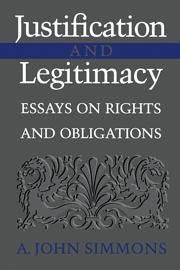Book contents
- Frontmatter
- Contents
- Introduction
- Acknowledgments
- 1 The Principle of Fair Play
- 2 Fair Play and Political Obligation: Twenty Years Later
- 3 The Obligations of Citizens and the Justification of Conscription
- 4 Associative Political Obligations
- 5 External Justifications and Institutional Roles
- 6 Philosophical Anarchism
- 7 Justification and Legitimacy
- 8 “Denisons” and “Aliens”: Locke's Problem of Political Consent
- 9 Human Rights and World Citizenship: The Universality of Human Rights in Kant and Locke
- 10 Original-Acquisition Justifications of Private Property
- 11 Historical Rights and Fair Shares
- 12 Makers' Rights
- Index
5 - External Justifications and Institutional Roles
Published online by Cambridge University Press: 05 June 2012
- Frontmatter
- Contents
- Introduction
- Acknowledgments
- 1 The Principle of Fair Play
- 2 Fair Play and Political Obligation: Twenty Years Later
- 3 The Obligations of Citizens and the Justification of Conscription
- 4 Associative Political Obligations
- 5 External Justifications and Institutional Roles
- 6 Philosophical Anarchism
- 7 Justification and Legitimacy
- 8 “Denisons” and “Aliens”: Locke's Problem of Political Consent
- 9 Human Rights and World Citizenship: The Universality of Human Rights in Kant and Locke
- 10 Original-Acquisition Justifications of Private Property
- 11 Historical Rights and Fair Shares
- 12 Makers' Rights
- Index
Summary
In his “Role Obligations,” Michael Hardimon defends an account of the nature and justification of institutional obligations which he takes to be clearly superior to the “standard view.” A “role obligation,” as Hardimon defines it, is “a moral requirement, which attaches to an institutional role, whose content is fixed by the function of the role, and whose normative force flows from the role” (334). The relevant institutional roles can be political (for example, the role of “citizen”), familial (for example, “sister”), or occupational (for example, “bus driver”) (334–35). On the “standard view” of role obligations, Hardimon explains, “contractual role obligations are acquired by signing on for the roles from which they derive,” while “noncontractual role obligations are extremely problematic, if they exist at all” (337; my emphases). Hardimon argues that this standard view presents a “misleading and distorted” picture of role obligations (and of morality generally); and in its strongest form this view still “leaves out” of its understanding of even contractual role obligations an “absolutely vital factor” (337, 357). I shall contend, by contrast, that a differently characterized “standard view” of institutional obligations is “standard” for a very good reason, namely, that it is true.
Hardimon's version of the “standard view” of role obligations could more precisely be called a (very simple) “voluntarist” view. We have, according to this view, only those institutional obligations which we have freely promised or contracted to perform. Institutional obligations which are simply imposed on us (or to which we are born) have no moral force at all.
- Type
- Chapter
- Information
- Justification and LegitimacyEssays on Rights and Obligations, pp. 93 - 101Publisher: Cambridge University PressPrint publication year: 2000
- 1
- Cited by



